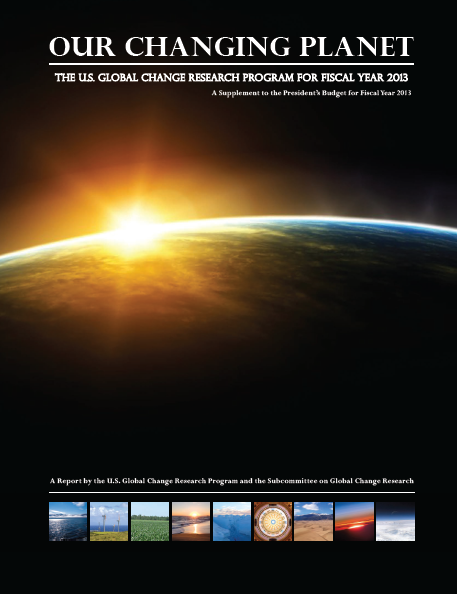Global Change Research to Benefit the Nation
 Today, the Administration’s interagency U.S. Global Change Research Program (USGCRP) delivered its annual report to Congress for fiscal year 2013: “Our Changing Planet.” The report highlights recent activities by 13 Federal agencies to strengthen our scientific understanding of global changes—including climate change—the threats and opportunities they present, and how they are likely to evolve over time.
Today, the Administration’s interagency U.S. Global Change Research Program (USGCRP) delivered its annual report to Congress for fiscal year 2013: “Our Changing Planet.” The report highlights recent activities by 13 Federal agencies to strengthen our scientific understanding of global changes—including climate change—the threats and opportunities they present, and how they are likely to evolve over time.
USGCRP’s scientific portfolio spans multiple systems and scales, from organisms to ecosystems to the entire planet—including changes brought about by human behavior as well as by larger natural forces. It incorporates information from nearly all forms of scientific work, including laboratory experiments, field research, computer modeling, scientific assessment, and observations of Earth from land, air, sea, and space. This vast body of work has been carried out by 13 government agencies—all working together to paint a clearer picture of global change so that citizens and decision makers have the information they need to plan, prepare, and respond.
Indeed, the benefits of this work extend far beyond pure science into domains that are directly relevant to the day-to-day lives of Americans and others around the world. They support weather forecasting, water and land resource management, agricultural crop production, and many other functions that impact lives, livelihoods, and communities.
The Our Changing Planet report released today showcases tangible results of work carried out by USGCRP agencies, including, for example, some of the most detailed, data-rich maps of Alaskan permafrost ever generated; the most precise map ever produced of carbon stored in Earth’s tropical forests; critical information about the number and magnitude of extreme weather events in the United States; and updated maps that help gardeners and growers plan for harvesting seasons.
USGCRP has supported these kinds of advances for more than two decades in fulfillment of its Congressional mandate to “understand, assess, predict, and respond to human-induced and natural processes of global change.”
Building on 20 years of scientific experience, USGCRP scientists continue to expand our knowledge of Earth’s past and present climate, improve projections of future climate change, and achieve a better understanding of the impacts and risks associated with global change—all with the aim of getting practical information, useful tools, and reliable data into the hands of those who need it.
I encourage you to learn more about USGCRP’s significant scientific contributions and how they benefit the Nation by reading this year's Our Changing Planet report.
Tom Armstrong is Executive Director of the US Global Change Research Program
White House Blogs
- The White House Blog
- Middle Class Task Force
- Council of Economic Advisers
- Council on Environmental Quality
- Council on Women and Girls
- Office of Intergovernmental Affairs
- Office of Management and Budget
- Office of Public Engagement
- Office of Science & Tech Policy
- Office of Urban Affairs
- Open Government
- Faith and Neighborhood Partnerships
- Social Innovation and Civic Participation
- US Trade Representative
- Office National Drug Control Policy
categories
- AIDS Policy
- Alaska
- Blueprint for an America Built to Last
- Budget
- Civil Rights
- Defense
- Disabilities
- Economy
- Education
- Energy and Environment
- Equal Pay
- Ethics
- Faith Based
- Fiscal Responsibility
- Foreign Policy
- Grab Bag
- Health Care
- Homeland Security
- Immigration
- Innovation Fellows
- Inside the White House
- Middle Class Security
- Open Government
- Poverty
- Rural
- Seniors and Social Security
- Service
- Social Innovation
- State of the Union
- Taxes
- Technology
- Urban Policy
- Veterans
- Violence Prevention
- White House Internships
- Women
- Working Families
- Additional Issues

